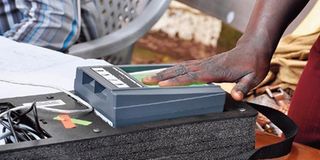Key Bunge team meets over voter listing fears

A BVR machine
What you need to know:
With a referendum and general election scheduled between April and October, the BVR system appeared to take one step forward and three back, essentially because of lack of funds and procurement glitches.
Dar es Salaam/Dodoma. Biometric Voter Registration (BVR) came under scrutiny yesterday in Parliament after lawmakers were told that the exercise was marred by controversies and would likely fail if emergency measures are not taken.
With a referendum and general election scheduled between April and October, the BVR system appeared to take one step forward and three back, essentially because of lack of funds and procurement glitches.
Given this state of affairs, Parliament yesterday stepped in to address the growing anxiety over the prospect of smooth registration of voters countrywide by means of the bio-technology identification system. Parliament’s Steering Committee held an emergency meeting yesterday to discuss the issue following a private motion by Nominated MP James Mbatia (NCCR-Mageuzi).
Sources at the closed-door meeting told The Citizen that a decision was reached to refer the issue to the Constitution, Legal Affairs and Governance Committee for further discussion. The team will report to the Steering Committee for further action. The Steering Committee meeting was called by Parliament Chairman Mussa Zungu Azzan following Mr Mbatia’s motion requesting Parliament to shelve the rest of the day’s activities and debate the BVR debacle.
Mr Mbatia said he was concerned that NEC’s move would undermine an earlier agreement with political stakeholders. “We have heard through media that NEC has announced preparations for voter registration using BVR in Lindi, Mtwara, Ruvuma and Njombe regions,” he added, “but, according to our earlier agreement, the exercise was not supposed to start until after NEC had consulted and agreed with stakeholders on how to conduct the registration. It is amazing that NEC has decided to continue with the registration without first meeting with political parties as agreed earlier.”
In Dar es Salaam, NEC Director of Elections Julius Malaba declined to comment on the matter and would not respond to queries as to whether they had already received the 7,500 Biometric Voter Registration (BVR) kits that were expected ahead of the launch of the registration.
Mr Malaba told The Citizen that the election watchdog would speak on the BVR kits at a press conference to be held later. “We will let you know any time from today what we are doing and how the exercise will be carried out,” he added. “There is no cause for alarm.”
In an unexpected move, Civic United Front Chairman Ibrahim Lipumba yesterday arrived at NEC offices at around 10.15 am, just a few minutes before his NCCR counterpart stood up in Parliament seeking the Speaker’s guidance on the voter registration woes. Prof Lipumba, who was flanked by his party’s deputy director of publicity and public relations, Mr Abdul Kambaya, was in Mr Malaba’s offices three minutes before the two came out and went into the office of NEC Chairman Damian Lubuva.
The opposition party leader was in Judge Lubuva’s office for more than an hour.
The Citizen could not immediately establish the reason for the surprise visit and what transpired in Judge Lubuva’s office. Prof Lipumba was unavailable for comment and NEC officials would not comment.
Lithotech Exports, the South African firm that won the tender to supply the BVR kits, also offered little explanation yesterday on the work progress. “There are many things to be done in the roll-out of this BVR project,” said Mr Oostewald Immink, the firm’s divisional managing director, in an email communication with The Citizen.
“Lithotech is not permitted to disclose such issues, and suggests that the NEC be approached for information if and when needed.” A fortnight ago, the NEC chairman told The Citizen that the electoral body was still waiting for 7,500 kits from the contracted supplier.“We are waiting for the kits to be delivered,” he said. “The supplier is currently working on the shortfalls observed during the trial run that involved 250 BVRs.”
Several hitches emerged during the trials last month in Kawe in Dar es Salaam, Kilombero in Morogoro and Mlele in Katavi. They included equipment failure and long hours to register scores of voters. Political parties are also concerned that, so far, NEC has only managed to procure BVR kits and not the crucial Electronic Voter Identification Devices (EVID).
EVID, which is commonly referred to as the “poll book” in Kenya, is used on Election Day to biometrically identify voters at polling stations based on the Certified Voter Registry created during the registration process.
Kenya, which in the 2013 general election procured 15,000 BVR kits, was able to register 14.3 million voters within 30 days but was later failed by EVID on polling day after the devices supplied by a South African firm, Face Technology, failed to function.




